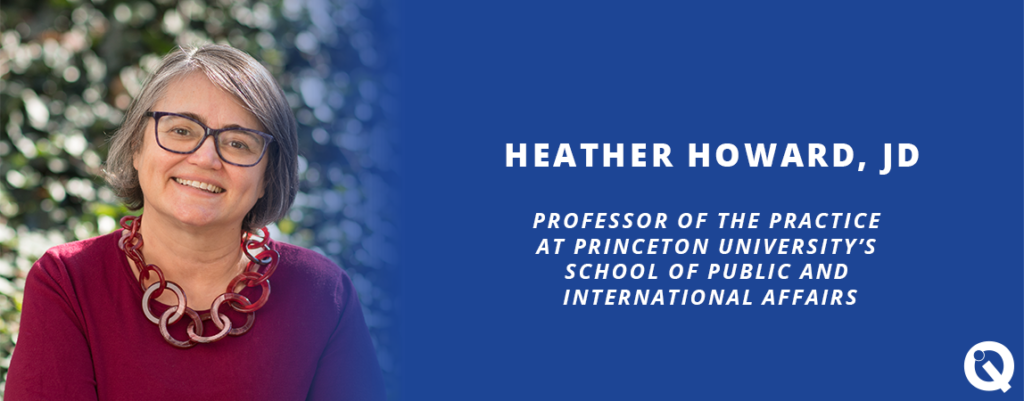Heather Howard, JD, a member of the Quality Institute’s Board of Directors, is a Professor at Princeton University. She is also co-director of the Center for Health and Wellbeing’s Global Health Program and director of State Health and Value Strategies, a Robert Wood Johnson Foundation-funded program assisting states with transforming their health care systems to be affordable, equitable, and innovative.
You served as New Jersey’s Health Commissioner from 2008-2010. How does that experience influence your work as a board member of the Quality Institute?
First, it’s a joy to serve on the board of the Quality Institute along with several other former New Jersey Health Commissioners. Dr. Jacobs (Fred. M. Jacobs, MD, JD), whom I followed as commissioner; Dr. Elnahal (Shereef Elnahal, MD, MBA); and Judy Persichilli, who served as Quality Institute Board Vice Chair before becoming our current Health Commissioner.
When I was Commissioner, the Quality Institute was an important partner. Now to participate in helping the Quality Institute complement the work of the State is a great opportunity. I’ll give you two examples. The first is all the great work the Quality Institute is doing to highlight the enormous value of primary care in advancing health equity. Another real passion of mine is maternal health — and that traces back to my time as Commissioner. To see this work flourish at the Quality Institute and to see the needed focus on reproductive health care and improving maternal health outcomes is so rewarding to me.
Your program, State Health and Value Strategies, advises states on critical issues in health care, including issues of importance to us at the Quality Institute. One issue is aligning the state and federal Surprise Billing laws to streamline protections for consumers. What is your advice for New Jersey?
New Jersey was ahead of the curve, and we have a robust surprise billing law that we should be proud of. It’s also exciting now that we have the new federal law — and the opportunity to align with that federal law. The state ought to be asking, are there areas where we can level up to the federal law? We can learn from our experience and find opportunities to strengthen the law and make it more protective of consumers. We need to ask: how do we make it easier for consumers to protect themselves? How do we reduce the bureaucratic burdens for consumers and promote affordability?
You’re also advising states as millions of people who have received health care coverage through Medicaid during the pandemic may no longer be eligible as the public health emergency comes to an end. What are the key steps for New Jersey and other states to make sure people have the time and support to find alternative coverage?
The federal government said that states could not disenroll anybody from Medicaid during the pandemic. As a result, enrollment in Medicaid increased significantly, providing a vital lifeline to many. At some point this year, however, as the public health emergency ends, states are going to have to go back and start re-determining people for eligibility. We think over 300,000 people in New Jersey are at risk of losing their Medicaid coverage.
Some of these people may be eligible for subsidies for affordable coverage through GetCoveredNJ. It will take a concerted effort by everyone in the system — government and community-based organizations, and specifically navigators — to prevent people from falling through the cracks. This will be the largest health insurance coverage event since the Affordable Care Act was implemented and could have significant health equity implications. People of color are overrepresented in the Medicaid program and are more likely to experience volatility and instability in employment and housing because of longstanding, structural racism, increasing the chances that these individuals could lose coverage for administrative reasons at the end of the public health emergency. The program I run at Princeton, State Health Value Strategies, has developed several resources to help state officials prepare for this transition and to preserve continuity of coverage and access to care, including a communications toolkit.
It’s budget season — and there are a lot of public health needs. What’s at the top of your wish list?
We’re going to be struggling for years to understand the impact of the pandemic on healthcare not related to COVID. For example, how many people delayed preventive screenings because they were afraid to go to the doctor. Maybe they delayed a mammogram or colonoscopy. We need to catch up on preventive screenings, from childhood vaccines to cancer screenings.
Also on my list is behavioral health. The opioid epidemic appears to have worsened during the pandemic. As we transition from to an endemic phase of COVID, how do we get the opioid crisis back on the front burner … as well as the broader behavioral health crisis that we know has exploded? In terms of state budget, I hope there’s a concerted focus on these challenges.
We like to ask a question beyond your professional life. Can you tell us what you are most grateful for?
I am grateful for the Affordable Care Act — the ACA (including expanded Medicaid coverage) has proven resilient and provided a safety net for people during the pandemic. I’m also grateful for the wonderful people at the New Jersey Department of Health; I know how hard they’ve worked to protect New Jersey throughout the pandemic.

